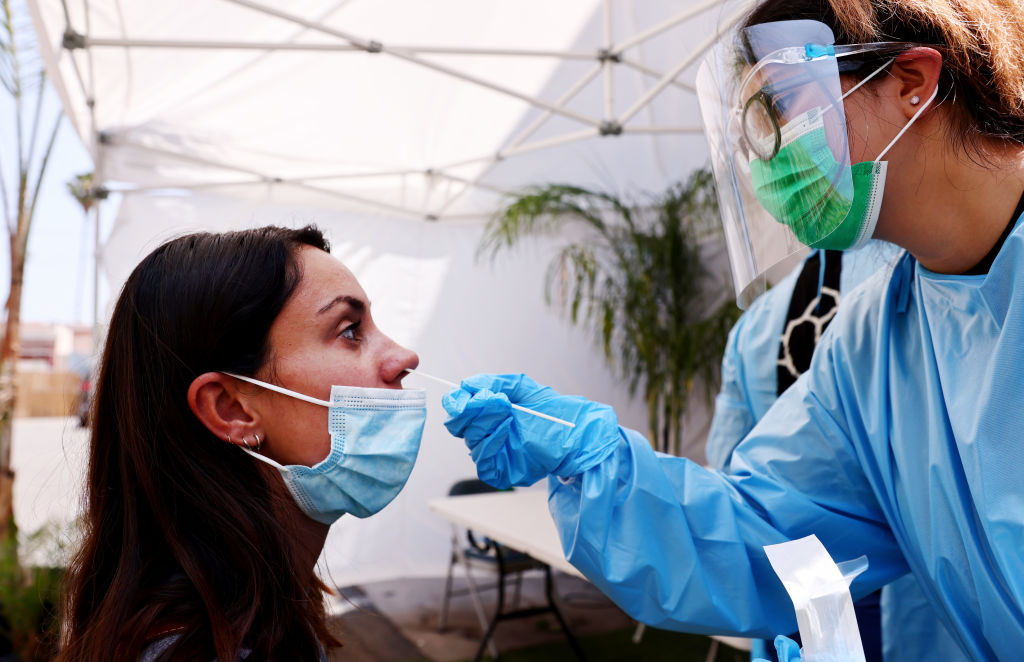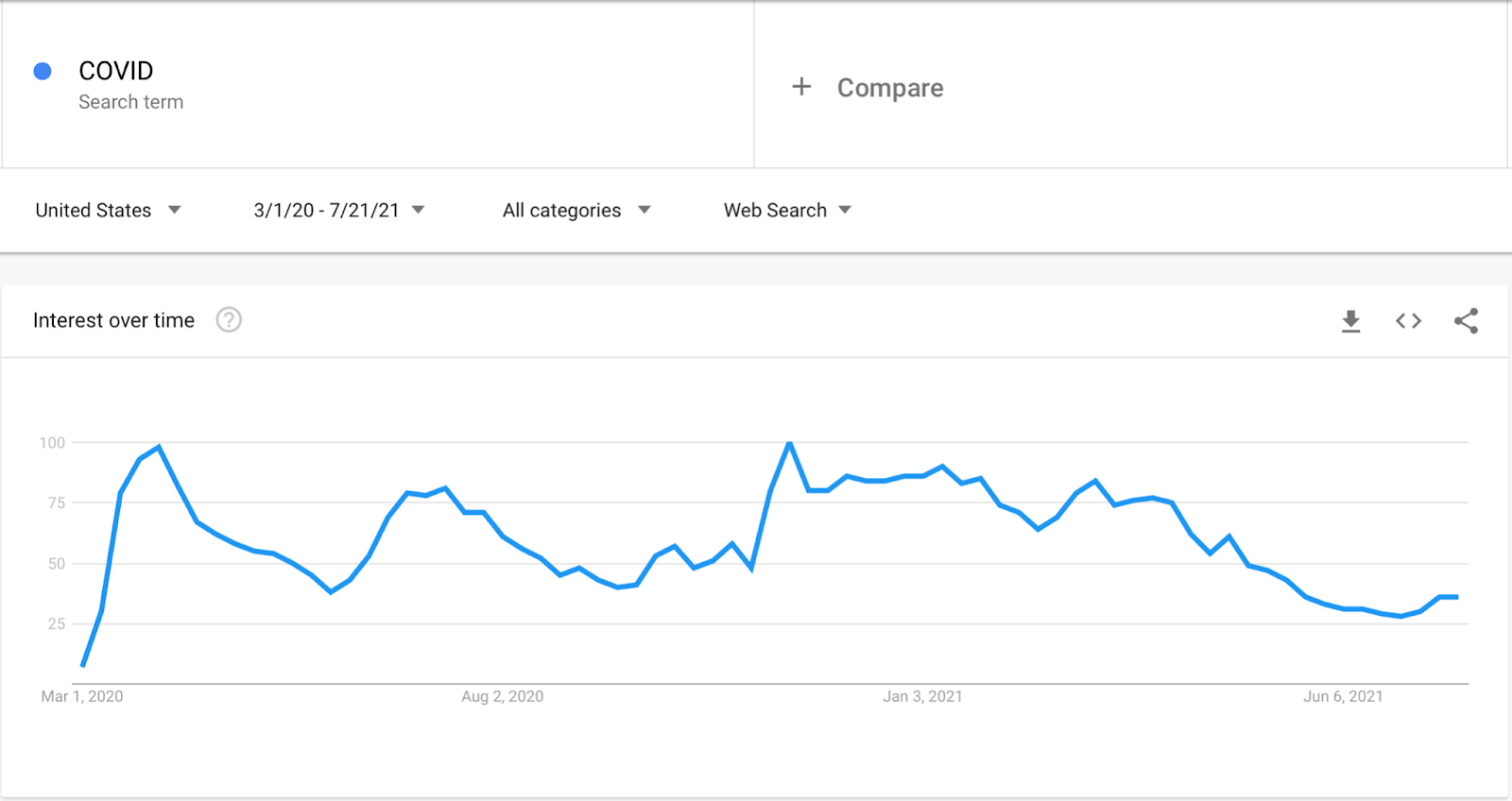Happy Wednesday! Even the most hardened of Chicagoan hearts can’t help but love Giannis Antetokounmpo. Congratulations to the Milwaukee Bucks on their first NBA championship in 50 years!
Quick Hits: Today’s Top Stories
-
Iran’s Supreme National Security Council has rejected a draft agreement negotiated indirectly with the United States that would have restored a version of the 2015 Joint Comprehensive Plan of Action, according to a spokesman for outgoing Iranian President Hassan Rouhani. Incoming President Ebrahim Raisi intends to renegotiate the agreement once he takes office, but that process could take months. “If we don’t have a deal before a new government is formed, I think that would raise serious questions about how achievable it’s going to be,” a U.S. official toldAxios last month.
-
Protests in Iran’s Khuzestan province over water shortages are heading into their sixth day, with Al Arabiyar eporting the demonstration’s death toll has risen to five.
-
Hundreds of Cuban demonstrators, including several high-profile artists and political dissidents, have been detained by the Cuban government and will likely face summary trials for alleged crimes committed during recent anti-government protests.
-
Tom Barrack—a private equity investor who chaired former President Donald Trump’s 2017 inaugural committee—was arrested on Tuesday on charges of acting as an unregistered agent of the United Arab Emirates, obstruction of justice, and making false statements in an interview with federal law enforcement officials. “The defendants repeatedly capitalized on Barrack’s friendships and access to a candidate who was eventually elected President, high-ranking campaign and government officials, and the American media to advance the policy goals of a foreign government without disclosing their true allegiances,” Acting Assistant Attorney General Mark Lesko said.
-
President Joe Biden on Tuesday announced his intention to nominate Jonathan Kanter to lead the antitrust division at the Department of Justice. Kanter, currently a partner at a boutique law firm, has long positioned himself as an opponent of large tech companies like Google.
-
Monsignor Jeffrey Burrill, general secretary of the U.S. Conference of Catholic Bishops (USCCB) resigned Tuesday after The Pillar approached the conference with evidence—“commercially available records of app signal data”—showing that “a mobile device correlated to Burrill emitted app data signals from the location-based hookup app Grindr on a near-daily basis during parts of 2018, 2019, and 2020.”
COVID State of the Union

After dominating the United States’ collective consciousness for nearly a year and a half, the coronavirus pandemic has—over the past few months—finally begun to fade from an ever-present, five-alarm fire to a mere steady drumbeat in the background. Most everyone who wanted a vaccine was able to get one by late April or early May, and the data was looking good. New cases fell from the winter’s unbearable peaks, followed by subsequent drops in hospitalizations and deaths. States around the country loosened their restrictions, families and friends reunited, workplaces repopulated, empty arenas filled with fans.
According to Google Trends data, online search interest for the catchall term “COVID” declined steadily from the beginning of March, reaching a pandemic low in the last week of June. Our TMD coverage more or less followed that trend; we spent much of June focused on national security, the economic recovery, congressional negotiations, and the Supreme Court term.

But in recent weeks, we’ve written about vaccine disinformation, potential booster shots, CDC school guidance, the Olympics’ fans dilemma, the Biden administration failing to meet its vaccination goals, and COVID outbreaks in migrant detention facilities. A new Olympic athlete seems to be dropping out of the games due to infection every day, and the Texas Democrats’ exodus to Washington we covered last week is quickly turning into a superspreader event. As much as we want to be done with COVID, COVID may not be done with us just yet.
Underlying this uptick in COVID coverage is an uptick in COVID cases. Although we did away with the TMD pandemic data a few weeks back, Declan’s still been collecting it behind the scenes in case we need to bring it back. When we last sent you an update, the seven-day rolling average of confirmed new cases was just under 12,500. This morning, it’s a hair above 37,500. The average number of Americans hospitalized with COVID-19 has risen from about 11,900 to 16,700 over the same time period, while daily deaths have declined slightly from 266 to 254.
We know why. The Delta variant—which epidemiologists have pegged as 50 percent more transmissible than the Alpha variant, which itself was about 50 percent more transmissible than the original strain of the virus—now accounts for 83 percent of all new COVID cases in the United States, CDC Director Dr. Rochelle Walensky said yesterday. At the beginning of the month, that number was just above 60 percent; in early June, it was 10 percent.
The good news? Although much more contagious than its predecessors, the Delta variant is not proving any more deadly. Plus, our existing vaccines are holding up under the strain. Study after study shows that two doses of an mRNA vaccine remain very effective at preventing infection from the Delta variant, and symptomatic illness or hospitalization even more so.
There will continue to be “breakthrough” infections—White House press secretary Jen Psaki disclosed yesterday that multiple fully vaccinated White House staffers have tested positive in the past—but those infections tend to be very mild, or even asymptomatic. Dr. Anthony Fauci said earlier this month that 99.2 percent of all COVID-19 deaths now occur among the unvaccinated, and Walensky added Friday that more than 97 percent of COVID-19 hospitalizations do as well. The vaccines, Associated Press reporter Nick Riccardi pointed out this week, “actually make the Delta variant basically the flu.”
Although cases are up in all 50 states, some are being hit much harder by the Delta resurgence than others. Full vaccination rates in states where the rate of hospitalization is the highest—Nevada, Missouri, Arkansas, Florida, Mississippi, Louisiana—tend to be in the mid-30sto low-40s, while the national average is closer to 50 percent. (Florida is somewhat of an exception, its vaccination rate is 48 percent.)
But even as case counts—and to a lesser degree hospitalizations—balloon once again, it’s unlikely that deaths will do the same. “We’re seeing a decoupling between cases and hospitalizations and deaths, and I think that’s likely to persist,” former Food and Drug Administration (FDA) commissioner and Pfizer board member Dr. Scott Gottlieb told CBS News’ Face the Nation this weekend. “England is seeing that as well, and they’re further ahead in terms of their Delta epidemic than us. And that’s because more of the vulnerable population has been vaccinated.”
Between the fully vaccinated and those who have already contracted COVID-19, Gottlieb estimated that only about a quarter of the U.S. population doesn’t have some sort of immunity built up. “But if 25 percent of the population remains susceptible to the virus, in absolute terms, that’s still a lot of people,” he added. “This variant is so contagious that … most people will either get vaccinated, or have been previously infected, or they will get this Delta variant. And for most people who get this Delta variant, it’s going to be the most serious virus that they get in their lifetime in terms of the risk of putting them in the hospital.”
Rep. Steve Scalise, the second highest ranking Republican in the House, doesn’t want to take the chance. “Especially with the Delta variant becoming a lot more aggressive and seeing another spike, it was a good time to do it,” he told NOLA.com Sunday, explaining why he decided to get his first dose over the weekend after holding out for months. “It’s safe and effective. … The FDA approval process is probably the most respected in the world.”
Senate Minority Leader Mitch McConnell—perhaps the GOP’s loudest and most consistent pro-vaccine voice—once again rebuked those pushing anti-vax theories and urged everyone to get the shot. “It never occurred to me after three highly effective vaccines were developed in under a year that we’d have difficulty getting Americans to take the shots, but that’s obviously where we are,” he said Tuesday. “These shots need to get into everybody’s arm as rapidly as possible, or we’re gonna be back in a situation in the fall that we don’t yearn for, that we went through last year.”
The Bell Tolls for Opioid Manufacturers
The huge spike in drug overdose deaths last year shone a spotlight on the despair, ennui, and self-destructive behavior into which many Americans sank during the stresses of the pandemic and accompanying lockdowns. But the opioid epidemic that has ravaged many American communities has been decades in the making.
The latest spike in opioid overdoses has largely been attributable to illegal drugs—first heroin, more recently its more potent synthetic cousin fentanyl. But for millions of Americans, chemical dependency originated not in recreational experimentation, but in pain pills they were instructed to take by their doctors.
In recent years, a dizzying array of individuals and groups have come forward with legal action against some of the pharmaceutical companies that produce opioid painkillers, alleging they pushed doctors to prescribe their products when they were not medically required and without fully disclosing their addictiveness. The effort has already won several prominent scalps: Purdue Pharma, the developer of OxyContin, filed for bankruptcy in 2019, eventually agreeing to pay an $8 billion settlement.
On Tuesday, attorneys involved with the complex network of cases announced what is likely to become the biggest development yet: a large-scale settlement with three huge pharmaceutical distributors—McKesson, Cardinal Health, and AmerisourceBergen—and Johnson & Johnson to the tune of $26 billion over the next two decades. Unlike the Purdue case, none of the defendants here will admit wrongdoing as part of the settlement. But plaintiffs allege that each played a critical role in funneling a massive quantity of dangerous but profitable prescription opioids to Americans around the country.
Per the New York Times:
The distributors, which by law are supposed to monitor quantities of prescription drug shipments, have been accused of turning a blind eye for two decades while pharmacies across the country ordered millions of pills for their communities. Plaintiffs also allege that Johnson & Johnson, which used to contract with poppy growers in Tasmania to supply opioid materials to manufacturers and made its own fentanyl patches for pain patients, downplayed addictive properties to doctors as well as patients.
Ten state attorneys general—Republican and Democrat—released a joint statement Tuesday saying that “negotiations are progressing well and potentially nearing their completion.”
“We look forward to bringing much-needed dollars home to our states to help people recover from opioid addiction and to fundamentally change the opioid manufacturing and distributing industries so this never happens again,” the statement continued.
As of now, the deal is primarily an agreement in principle; the number of suits against the companies is enormous, and a large majority of the states involved in lawsuits need to agree to the terms before it can become official. Other plaintiffs may elect to forgo the settlement and carry on their suits alone. Meanwhile, a plethora of other opioid-related suits are ongoing. The pharmacies of Walmart, Rite Aid, CVS, and Walgreens agreed last week to pay a combined $26 million to two New York counties to settle another suit.
Worth Your Time
-
After last summer’s protests—and the resulting “defund the police” movement—who still wants to be a cop? That’s the question at the heart of Lane DeGregory and John Pendygraft’s recent multipart series for the Tampa Bay Times. The pair followed a few dozen recruits who enrolled at St. Petersburg College’s Law Enforcement Academy in September and documented how the events of last summer changed everything—and nothing. “Some registered for the academy last spring, before George Floyd was killed, before people took to the streets demanding that governments defund the police. They decided to attend anyway,” the introduction reads. “Others applied because of those outcries. They know they will be insulted, targeted, hated—some critics are openly hostile. But 30 young people signed up for the first class since the pandemic closed the academy.”
-
You may remember that the Justice Department announced last October it had arrested a handful of men for conspiring to kidnap Michigan Gov. Gretchen Whitmer. Ken Bensinger and Jessica Garrison looked into the circumstances surrounding the arrests in a deeply reported piece for BuzzFeed News, noting that the federal government relied on at least 12 confidential informants in the sting. “The audacious plot to kidnap a sitting governor—seen by many as a precursor to the Jan. 6 assault on the US Capitol by hundreds of Trump-supporting protesters—has become one of the most important domestic terrorism investigations in a generation,” they write. “The case epitomizes the ideological divisions that have riven the country over the past several years. To some, the FBI’s infiltration of the innermost circle of armed anti-government groups is a model for how to successfully forestall dangerous acts of domestic terrorism. But for others, it’s an example of precisely the kind of outrageous government overreach that radicalizes people in the first place, and, increasingly, a flashpoint for deep state conspiracy theories.”
-
Jeff Bezos’ quick trip to space Tuesday aboard his Blue Origin rocket has been the focus of much online mockery, but Liz Wolfe argues in Reason that yesterday was a great day for the rest of us non-billionaires, too. “Just as dental care, car ownership, and airplane travel were once the sole province of the wealthy, so too is space tourism—for now, but probably not forever,” she writes. “Private spaceflight, which is currently accessible only to those who can fork over a cool $28 million or who were born a billionaire’s baby brother, may someday be a feasible vacation option for people who don’t have such wealth. But even if it doesn’t pan out that way, the technologies created by billionaires’ space fantasies will propel many of us, rich and poor alike, to better standards of living in ways we haven’t yet fully realized.”
Presented Without Comment
Also Presented Without Comment: Giannis Learns to Love America Edition
Toeing the Company Line
-
In yesterday’s French Press (🔒), David maps out where he stands in this turbulent political moment—both ideologically and dispositionally. “As life has opened up, I’ve gotten back on the road, and I’m connecting again with old friends in the conservative movement,” he writes. “And I’m getting a repeated question: ‘Are you still with us?’ I’m starting to answer with a question of my own. ‘I remember when we believed the same things. Are you still with me?’”
-
Sarah and company continued their 2024 GOP primary series in Tuesday’s Sweep, taking a look at Nikki Haley, Mike Pompeo, and Mike Pence’s chances. Stick around for Chris Stirewalt’s thoughts on the use (and abuse) of polling in political journalism.
-
Speaking of Chris Stirewalt, he commandeered The Remnant yesterday for a conversation with Harry Enten, a political analyst for CNN. Why was 2020 polling so inaccurate? What messages are most effective at swaying vaccine skeptics? Which diet cola is America’s finest?
-
Advisory Opinions was released on Tuesday this week! David and Sarah chat about the free speech violation inherent in Anaheim’s decision to cancel an America First rally with Matt Gaetz and Marjorie Taylor Greene, a federal judge’s recent DACA ruling, and a pair of cases involving schools and religion.
-
For non-Catholics, the hullabaloo over Pope Francis’ decree regarding traditional Latin Mass was confusing. What does his order really say? What is the divide over the Latin Mass really about? Emma explains in a piece for the site.
Let Us Know
Will the influx in new COVID cases cause you to change your behavior at all? Have you considered pulling those masks back out?
Reporting by Declan Garvey (@declanpgarvey), Andrew Egger (@EggerDC), Charlotte Lawson (@charlotteUVA), Ryan Brown (@RyanP_Brown), Harvest Prude (@HarvestPrude), Tripp Grebe (@tripper_grebe), Emma Rogers (@emw_96), Price St. Clair (@PriceStClair1), Jonathan Chew (@JonathanChew19), and Steve Hayes (@stephenfhayes).






Please note that we at The Dispatch hold ourselves, our work, and our commenters to a higher standard than other places on the internet. We welcome comments that foster genuine debate or discussion—including comments critical of us or our work—but responses that include ad hominem attacks on fellow Dispatch members or are intended to stoke fear and anger may be moderated.
You are currently using a limited time guest pass and do not have access to commenting. Consider subscribing to join the conversation.
With your membership, you only have the ability to comment on The Morning Dispatch articles. Consider upgrading to join the conversation everywhere.